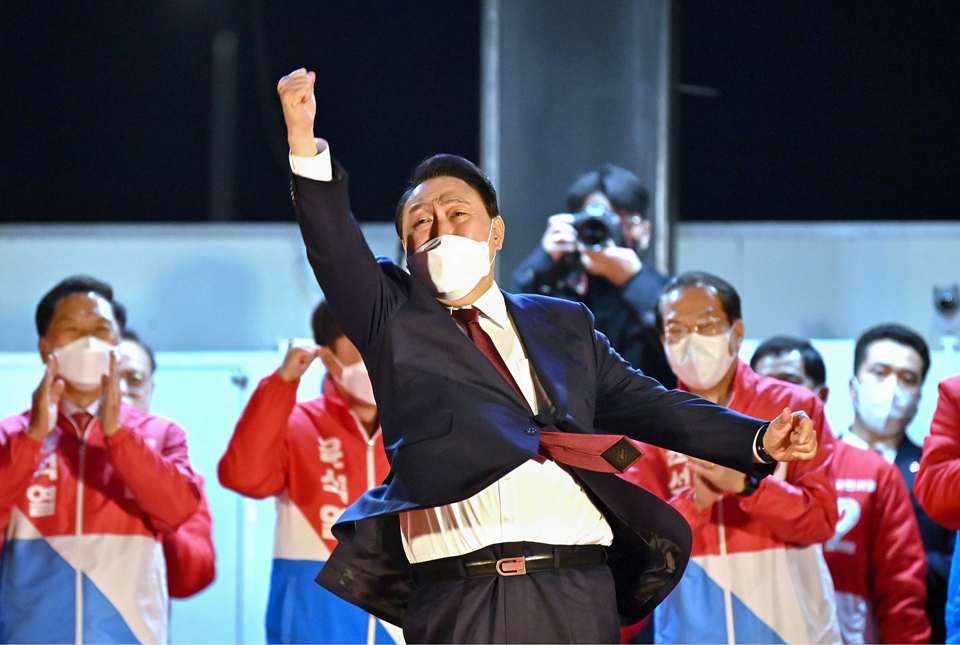
SEOUL, March 10, 2022 (BSS/AFP) - Conservative Yoon Suk-yeol won South
Korea's presidential election Thursday, with the political novice and avowed
anti-feminist immediately promising a more hawkish policy on the nuclear-
armed North.
After a bitter, hard-fought election campaign Yoon, formerly a top
prosecutor who has never held elected office, was declared winner as rival
Lee Jae-myung from the incumbent Democratic party conceded defeat.
His victory of his People Power party looks set to usher in a more
muscular foreign policy for the world's tenth largest economy after the
dovish approach pursued by outgoing President Moon Jae-in during his five
years in office.
Yoon will immediately have to confront an assertive Pyongyang, which has
embarked on a record-breaking blitz of weapons tests this year, including a
launch just days before the election.
He vowed Thursday to "sternly deal" with the threat posed by Kim Jong Un's
regime.
"But the door to dialogue is always open," he told supporters after
visiting the national cemetery in Seoul.
Yoon has also called for a more robust relationship with ally Washington,
and spoke to US President Joe Biden early Thursday, vowing to maintain "close
coordination" on North Korea.
His victory margin was razor-thin: Yoon had 48.56 percent of the vote
against Lee's 47.83 percent, according to South Korea's National Election
Commission.
Despite a campaign dominated by mud-slinging, voter turnout was 77.1
percent, including record early voting, with interest strong and the stakes
high in the country of some 52 million.
"After a divided electorate has produced a divided government, Seoul may
struggle to pursue policies of reform rather than politics of retribution,"
said Leif-Eric Easley, a professor of international studies at Ewha Womans
University in Seoul.
Moon's Democratic Party has a super-majority in the country's parliament,
which could frustrate Yoon, who has no legislative experience, from pursuing
his starkly different agenda.
"His lack of experience on any real policy making is a serious concern,"
Karl Friedhoff of the Chicago Council on Global Affairs told AFP.
- Political revenge? -
Yoon's election is a dramatic redemption for South Korea's conservatives,
who were left in disarray in 2017 after their president Park Geun-hye was
impeached.
It could restart the "cycle of revenge" in South Korea's famously
adversarial politics, analysts say, where presidents serve just a single term
of five years and every living former leader has been jailed for corruption
after leaving office.
On the campaign trail, Yoon threatened to investigate outgoing President
Moon Jae-in, citing unspecified "irregularities".
But in his victory speech, he struck a more conciliatory tone, telling the
country: "The competition is over now, and everyone must make joint efforts
to become one."
The frontrunners, who were both so unpopular that local media branded it
the "election of the unfavourables", were neck and neck in the polls for
months.
Yoon clinched victory because voters wanted a "change of power" not
because they strongly supported him or his agenda, analyst Park Sang-byoung
told AFP.
"Moon enjoys high approval ratings but it couldn't measure up the people's
demand for change," he said.
With such razer-thin support, it will be risky for Yoon to pursue the
outgoing administration legally after he assumes office, Park added.
- 'My heart is very heavy' -
Young swing voters were a decisive factor in the race, analysts said, with
top concerns being skyrocketing house prices, social inequality and youth
unemployment.
He also specifically courted disgruntled young male voters, with a promise
to abolish the gender equality ministry, on the basis that South Korean women
do not suffer from "systemic gender discrimination", despite evidence to the
contrary.
"My heart is very heavy and desperate," said Kim Ju-hee, a women's rights
activist.
Yoon's win has "set a precedent where a president-elect can openly
ridicule women," she added.
Exit polls showed Yoon getting 58.7 percent support from men in their 20s,
compared to Lee at 36.3 percent.
But for women in their 20s, Lee received 58 percent to Yoon's 33.8.
"The widespread support Yoon enjoys from young men is, frankly, absolutely
terrifying from a woman's point of view," academic and female voter Keung
Yoon Bae told AFP.
Voters wore medical masks to cast their ballots, as an Omicron spike sent
cases skyrocketing and forced over a million people to self-isolate at home.
The country amended its electoral laws to allow them to vote and people
also embraced early voting in record numbers.
Yoon will formally succeed Moon in May. The incumbent remains popular,
despite not achieving a promised peace deal with North Korea.